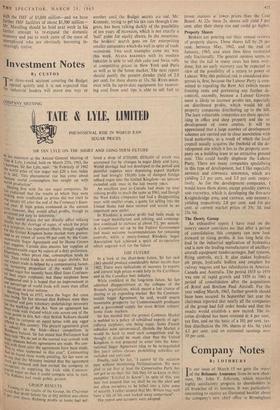Investment Notes
By CUSTOS
LIE three-week account covering the Budget Opened quietly and it is not expected that the industrial leaders will move one way or another until the Budget secrets are out. Mr. Kennedy, trying to get his tax cuts through Con- gress, has been talking darkly of the possibility of ten years of recession, which is not exactly a `bull' point for equity shares. In the meantime, the brokers' search goes on for enterprising smaller companies which do well in spite of trade recessions. Two such examples came my way this week. AVANA BAKERIES with its modern bakeries is able to sell slab cake and Swiss rolls at competitive prices in New York and Paris as well as in the home market. The next report should justify the present slender yield of 2.8 per cent for these shares at 12s. 9d. RYAN HOLD- INGS with its up-to-date equipment for recover- ing coal from coal tips is able to sell fuel to.
power stations at lower prices than the Coal Board. At 22s. these 2s. shares still yield 5 per cent. after their sharp rise and could go higher.
Property Shares Brokers are pouring out their annual reviews of property shares. These shares fell by 28 per cent. between May, 1962, and the end of January, 1963, and since then have recovered only fractionally. The general opinion seems to be that the fall in many cases has been over- done, but no early recovery can be expected in view of the possibility of a return to power of Labour. Why this political risk is considered dan- gerous is, first, because the Labour Party is com- mitted to repealing the Rent Act (which means freezing rents and preventing any further de- control), secondly, because a Labour Govern- ment is likely to increase profits tax, especially on distributed profits, which would hit all property companies distributing up to the hilt. The least vulnerable companies are those special- ising in office and shop property and the re- development of town centres. It will be appreciated that a large number of development schemes are carried out in close association with local authorities, as a result of which the local council usually acquires the freehold of the de- velopment site which it lets to the property com- pany on a building lease at an attractive ground rent.- This could hardly displease the Labour Party. There are many companies specialising in this type of development, but I like especially ARNDALE and COPTHALL HOLDINGS, which are yielding 2.3 per cent. and 3.3 per cent. respec- tively. As for the development companies, l would leave them alone, except possibly csPerst. AND COUNTIES, which is developing the five-acre Knightsbridge area, and CENTRAL AND DISTRICT, yielding respectively 2.8 per cent, and 3.6 per cent. at current market prices of 35s. 3d, and 21s. 6d.
The Dowty Group An exhaustive report I have read on the DOWTY GROUP convinces me that after a period of consolidation this company can now look forward to rising profits. It has long held the lead in the industrial application of hydraulics and is now the leading manufacturer of ancillary aircraft equipment (undercarriages, fuel systems, flying controls, etc.). It also makes hydraulic pit props, hydraulic buffers and couplers for railway wagons and has subsidiaries in America, Canada and Australia. The period 1955 to 1959 was one of rapid growth and 1959 to 1961 a period of consolidation after the acquisitions of Rotol and Boulton Paul Aircraft. For the year ending March, 1963, further growth should have been secured. In September last year the chairman reported that nearly all the companies of the group had full order books and that the results would establish a new record. The in- terim dividend has been retained at 4 per cent.. tax free, and on the basis of a 101 per cent. tax- free distribution the 10s. shares at 41s. 9d. yield 4.1 per cent. and on estimated earnings over 10 per cent.














































 Previous page
Previous page